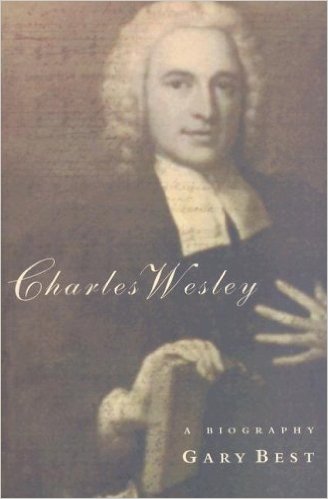Gary Best: Charles Wesley
 Gary Best, Charles Wesley: A Biography (Peterborough: Epworth, 2006), 390 pages, ISBN 9780716206156.
Gary Best, Charles Wesley: A Biography (Peterborough: Epworth, 2006), 390 pages, ISBN 9780716206156.
This is a very fine book about Charles Wesley. Yes, I did say “Charles Wesley”. As author Gary Best points out, there have been many books written about John Wesley, but his brother Charles has not been so fortunate. This biography seeks to address that imbalance and in the process reveal Charles Wesley to be much more than a hymn writer, though his hymns and other poetry are scattered throughout the book’s pages. Best argues that Charles has not been given the credit due to him for his important part in the founding of Methodism.
Charles, like his brother, was a traveling preacher for many years. Some contemporaries regarded him as a better preacher than John. It could be said that John’s preaching was logical, Charles’s was passionate, and their contemporary George Whitefield’s was dramatic and dynamic.
Charles Wesley was born prematurely and nearly did not survive. Probably partly because of that, in later life he suffered from a range of medical conditions, which limited his outdoor ministry from late middle age. His happy marriage to Sally Gwynne also contributed to his giving up the life of a traveling preacher, though this did not stop him ministering in London and Bristol in the south of England.
He was four years younger than John, and usually bowed to his older brother’s authority. Yet it was Charles, not John, who started the Holy Club at Oxford, though when John moved back to Oxford he took on its leadership. It was even Charles who first experienced his heart being warmed by God’s Holy Spirit in May 1838. That is, Charles was converted a few days before his older brother (assuming that the experiences of God that they had at that time were their conversions).
One mistake, I think, the Wesley brothers made was to insist on Methodism remaining in the Church of England. With the benefit of hindsight, it appears to have always been a vain hope. John insisted that the movement remain in the Established Church, though he occasionally wavered; Charles insisted on it and never for one moment doubted the correctness of his belief and actions. Yet when both were dead Methodism drifted from the Anglican Church.
At times the brothers clashed. One area of dispute was over the issue of Christian Perfection. Both Charles and John believed that a Christian could be perfect in this life (though there is disagreement about what they meant by that). John wrote a book about it, A Plain Account of Christian Perfection, and Charles, inevitably, wrote hymns that taught it. One of his hymns on perfection is “God of all power and truth and Grace”. It has such lines as “perfect holiness in me”, “Purge me from every evil blot”, “cleanse me from every sinful thought”, “Give me a new, a perfect heart”, and, in case those prayers might be thought to refer to our existence in heaven, he says “O that I now, from sin released…”
But while the brothers agreed on the teaching they did argue on its outworking. John was more ready than Charles to regard some fellow Christians as having reached perfection. Charles warned his brother that many of those who were claiming to be perfect were boasting about the fact. In other words, not unreasonably, Charles thought that the boasters were far from perfect. John disagreed and this did cause tension between them.
There is, I believe, one major problem with this book. Best gives what I think is an unfair picture of John Wesley. He makes a lot of criticism of him and offers too little praise. It is true that John wanted to be boss, made sure that he was boss, and made it clear to everyone, including Charles, that he was boss, but there was a better side to him. He was often compassionate and caring, and he had a wonderful rapport with the poor that few, if any, well-educated men of his time could match.
Having offered that criticism let me make it clear that this is a fine book and well worth reading. It is also an important book because of the lack of other material on the life of Charles. Gary Best captures Charles Wesley as a man of courageous action as well as a thoughtful churchman, theologian and poet. He also gives some wonderful insights into early Methodism. Make sure you read it.
Reviewed by David Malcolm Bennett.
Category: Church History, Fall 2015


